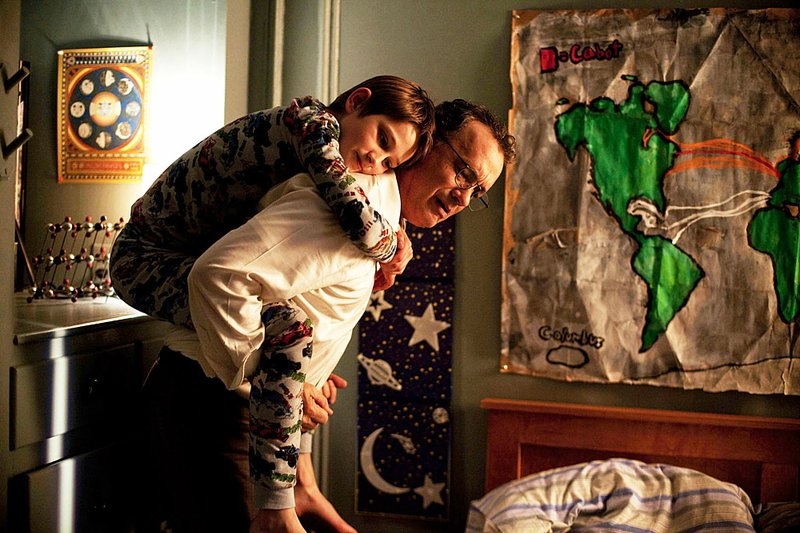LITTLE ROCK — I don’t know why Stephen Daldry’s Extremely Loud and Incredibly Close is such a divisive movie. I only know that people tend to either love or hate it, and that I managed not to care too much one way
or another about it, although I recognize the craft and ambition that went into its making and can identify one scene (the falling man mo
tif, which seems endemic to all 9/11 movies) that, for me at least, seemed a serious lapse in taste.
Other than that, the movie seems a perfectly reasonable attempt to dramatize (and therefore contain) the shattering reverberations of the terrorist attacks of Sept. 11, 2001. Of course, there are some who will find the very idea of such a film morally repugnant and reductive, just as there are people who resist any cinematic portrayal of the Holocaust. My own idea is that we ought not proscribe artists from making use of whatever materials they will to try to shock and awe us into feeling.
That said, there’s nothing very special about Extremely Loud and Incredibly Close, other than the remarkable Max von Sydow and a preternaturally alert performance by young Thomas Horn, the 13-year-old Jeopardy! champion who plays Oskar Schell, the precocious 9-year-old at the center of the movie.
Oskar is the socially awkward son of a Manhattan jeweler (Tom Hanks). Oskar informs us that he has been tested for Asperger’s syndrome and the tests were inconclusive, but it’s obvious to us from his abrupt nature and fascination with detail that the boy’s wiring isn’t the usual thing. He has been alternately indulged and challenged by his parents (mom is played by Sandra Bullock), especially his doting father, who sends him out into the city on “reconnaissance expeditions” of discovery that often have him asking frank, if not rude, questions of total strangers.
I’m not a parent but I think maybe the film should carry some kind of warning that perhaps you shouldn’t try this at home, especially if you live in New York City like the Schells. But then, everyone Oskar encounters seems patient and helpful, with the only bad guys who inhabit the world apparently having incinerated themselves in the towers on what Oskar repeatedly refers to as the “worst day ever.”
On that day, Oskar’s father happened to be on the 115th floor of the World Trade Center. And he happened to have left a series of increasingly disturbing messages on the Schells’ answering machine. And Oskar not only heard them, he has fetishized them, making the answering machine the center of a secret shrine he has made to his father. (He, uh, replaced the answering machine with a brand new version of the same model, and his grief stricken mom apparently never noticed.)
Then, while rummaging through his father’s closet in the aftermath of the attacks, Oskar finds a key, which he convinces himself holds some sort of secret that his father means for him to unlock. And so he embarks on a quest, one that takes him into contact with a long list of strangers, including his grandmother’s mysterious, mute boarder (von Sydow), a man so involuted he has chosen not to speak, instead writing (or having tattooed - for that would freight the gesture with a deeper resonance) on one palm the word “yes” and the other “no.”
In general, the performances of the main actors are fine to excellent. Hanks is sympathetic, mildly nerdy and plush-toy squishy as the idealized father; Bullock manages a late-inning reversal of character credibly (though, once again, credulity-straining); Viola Davis and Jeffrey Wright shine briefly in small roles.
Daldry relies a bit too heavily on Horn’s narration, although you understand the device. It’s the kid’s story after all, unspooling from his somewhat benighted perspective, and while I haven’t read the Jonathan Safran Foer novel on which the film is based, I can imagine it’s similar to Mark Haddon’s The Curious Incident of the Dog in the Night, a putative first person account by an autistic teenager.
Oskar’s perspective is integral to the story - we need his version of reality. As I write this, I realize I’m coming close to resolving the problem I set out in the lead. While I can’t help but be aware of an accumulation of implausibilities and precious filigree that seems likely to put off the discriminating moviegoer, I also understand the film is an emotional tsunami likely to wash away any dry objections in the susceptible.
So while some will find it depressingly manipulative and even cheap, others will receive Extremely Loud and Incredibly Close as the best movie of the year. Despite its often awkward storytelling and cutesy character tokens - Oskar’s grandmother communicates with her grandson via walkie-talkie. Over. - it is all about half-orphaned sons and murdered fathers, about a family trying to carry on after having its heart ripped out.
About a city (maybe a country) suffering post-traumatic depression, gingerly picking its way through its own ruins.
I don’t doubt that these strangers might behave kindly toward a rude little boy who has lost his father. It’s nice to think that a story like this one could play out, and not end in some awful tragic way. I don’t think it would, but it is nice to think it.
Extremely Loud and
Incredibly Close 87
Cast:
Thomas Horn, Sandra Bullock, Tom Hanks, Viola Davis, Max von Sydow, Zoe Caldwell, Jeffrey Wright
Director:
Stephen Daldry
Rating:
PG-13, for thematic material, disturbing images, and language
Running time:
130 minutes
MovieStyle, Pages 33 on 01/20/2012
